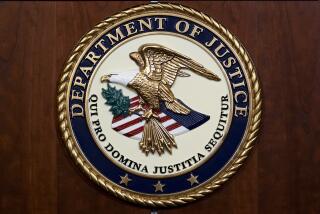Taliban leader’s arrest hinged on U.S. information
The United States has delivered a fleet of drone aircraft and billions of dollars in aid to coax Pakistan to do more to confront Afghan Taliban militants taking refuge in the country.
But the Islamist group’s second in command was captured in Karachi last week largely because the United States was also able to provide something else Pakistan has demanded for years: solid intelligence on where Mullah Abdul Ghani Baradar could be found.
U.S. and Pakistani officials said Tuesday that the capture of Baradar was driven by a rare intelligence break that enabled American spy agencies to pinpoint the Taliban military chief and help Pakistan’s intelligence service organize on short notice a daring operation to arrest him.
Officials in Washington said the capture spotlights a heightened level of cooperation that the United States has pursued aggressively in recent years through a campaign of diplomatic and military pressure. The effort involved a nearly constant stream of often secret visits by top U.S. officials, as well as more unconventional inducements. Twice over the last six months, CIA Predator drones have been used to kill the leaders of the Pakistani Taliban faction responsible for attacks in Pakistan.
But as for the arrest of Baradar, one U.S. official said: “It’s not just a matter of their motivation; it’s a matter of opportunity that we present. I don’t think it’s fair to say they decided they wanted to help us all of a sudden. We don’t get great opportunities at these guys all the time.”
Officials provided few specifics Tuesday on the nature of the intelligence that led to the capture. U.S. spy agencies have been tracking Baradar’s communications and activity closely since December, officials said, but even so, the intelligence that enabled the raid in Karachi involved an unexpected break. “Fortune played a role,” one U.S. official said.
A Pakistani military official gave a similar account, saying U.S. suspicions of Islamabad’s motives have been unfounded and that the problem from Islamabad’s perspective was a lack of reliable intelligence.
“For the last two years, no one had shared credible intelligence on the whereabouts of anyone in the Quetta shura,” the official said, referring to the Afghan Taliban leadership council, believed to be based in Quetta, in southern Pakistan.
Baradar was a senior figure in the council and presided over the military campaign to reclaim power in neighboring Afghanistan.
Pakistan’s Inter-Services Intelligence agency, which has a network of informants, has helped direct dozens of CIA Predator strikes in the tribal belt along the Afghanistan-Pakistan border. But captures of top Al Qaeda or Afghan Taliban figures in Pakistan’s teeming cities have often depended on intelligence provided by the CIA, as was the case with Baradar.
Referring to such intelligence, the Pakistani official said, “As long as it is shared with us, you will find the results.”
Officials at the CIA and White House declined to comment on the arrest.
But U.S. intelligence and military officials described a long-standing effort to locate Baradar, who is outranked in the Taliban by its spiritual leader, Mullah Mohammed Omar, but is regarded as an operational director who in may ways has served a more important day-to-day role.
In December, U.S. intelligence officials learned that Baradar had told Taliban leaders that he was planning to return to Afghanistan to take “direct responsibility” for military operations.
U.S. officials at the time did not know whether Baradar was truly intent on returning to the country. He may have been trying to boost the morale of Taliban leaders, one official said. But he also could have been trying to counter the U.S. decision to deploy more troops, or might have wanted to put out disinformation.
Regardless, the official said, the intelligence showed weakening Taliban morale.
“The Taliban senior leaders are not in the fight, and that has burned the” rank and file, the official said.
Baradar, who was captured with three other Afghans in a Karachi neighborhood called Nooriabad, is in Pakistani custody and being questioned by interrogators working closely with the CIA. It was unclear whether he was cooperating, but analysts said that any information he provided could lead to other arrests as well as operations aimed at unraveling Taliban communications and supply networks.
Analysts noted that the Taliban movement rebounded quickly from other leadership losses resulting from capture or assassination. Those include the arrest of Mullah Obaidullah Akhund, a top deputy to spiritual leader Omar, and the killing of senior military commander Mullah Dadullah, both in 2007.
Mohammad Arsalan Rahmani, a former official in the Taliban government who is now a lawmaker, said Baradar’s battlefield directives -- heavy use of homemade bombs, hit-and-run ambushes, avoidance of large-scale head-on confrontations -- have already been incorporated into the Taliban mode of fighting.
Even so, Baradar’s capture was seen as a blow to Taliban military capabilities.
“It will definitely have an effect; the Taliban will have some problems due to his absence,” Rahmani said.
In Afghanistan, a Taliban spokesman denied that Baradar was in custody.
At times, U.S. officials have implied that the only impediment to arresting Baradar and others was Pakistani will. Speaking of Al Qaeda leader Osama bin Laden and other terrorists during a visit last year to Islamabad, the capital, Secretary of State Hillary Rodham Clinton angered Pakistani officials by saying, “I find it hard to believe that nobody in your government knows where they are and couldn’t get them if they really wanted to.”
The U.S. has resisted repeated requests from Pakistan for its own fleet of armed Predators. But last month, Defense Secretary Robert M. Gates approved the delivery of a dozen smaller, unarmed drones in a compromise designed to bolster an often wobbly counter-terrorism alliance.
The issue of pursuing the Afghan Taliban is a highly sensitive topic in Pakistan, where elements of the country’s intelligence community have long maintained close ties with the militant group. Pakistanis historically have not regarded the Afghan Taliban as a threat, instead directing their resources and manpower against the Pakistani Taliban, which is responsible for waves of suicide bombings and other acts of terrorism that have killed scores of civilians.
Pakistani analysts said Baradar’s arrest could become a steppingstone to expanded collaboration between American and Pakistani intelligence agencies in tracking down Omar, who is believed to be hiding in southern Pakistan.
“If they can capture Baradar, they can capture Omar,” said Rustam Shah Mohmand, a former Pakistani ambassador to Afghanistan.
Though the West is pleased with Pakistan’s cooperation, experts say a more aggressive campaign against the Afghan Taliban could prove risky.
Pakistan wants to ensure that it maintains an influential role in any negotiations aimed at resolving the U.S.-Taliban conflict, but Baradar’s arrest could jeopardize that.
“I don’t think Pakistan wants to create a situation where the Afghan Taliban begins mistrusting Islamabad,” said Javed Hussain, a retired Pakistani brigadier and former special forces commander. “That will lead to conflict.”
alex.rodriguez @latimes.com
Times staff writers Julian E. Barnes in Washington and Laura King in Kabul, Afghanistan, contributed to this report.
More to Read
Sign up for Essential California
The most important California stories and recommendations in your inbox every morning.
You may occasionally receive promotional content from the Los Angeles Times.










